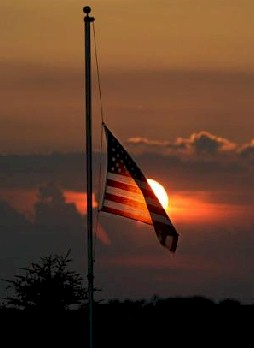WARNING: MAJOR HANKIE ALERT!

Hero awarded Air Force Crossby Terry Walker
377th Air Base Wing Public Affairs 09/16/02 - KIRTLAND AIR FORCE BASE, N.M. (AFPN) -- Senior Airman Jason D. Cunningham, a pararescueman who lost his life in Afghanistan while saving 10 lives and making it possible for seven others who were killed to come home, was posthumously awarded the Air Force Cross here Sept. 13. The Air Force Cross is awarded for extraordinary heroism while engaged in action against an enemy of our nation. It is second only to the Medal of Honor. "We gather to salute his bravery and to reward his heroism," said Secretary of the Air Force Dr. James Roche. "We gather to pay tribute to an airman who, on the field of battle, not only gave his life serving his nation, but also gave his life serving his fellow Americans." Air Force Chief of Staff Gen. John Jumper presented the Air Force Cross to Cunningham's wife, Theresa. Cunningham's parents, Lawrence and Jackie Cunningham, also received medals from Jumper. "In the frailty of our human existence we are ill equipped to express the extremes of our emotions," Jumper said. "For in the peak of our love or the depths of our sorrow, we have only feeble words that never truly capture the peaks and valleys of our feelings. "I stand before you today in the humble attempt to assemble the words to honor a hero, knowing in advance that my attempt will fall short of the tribute that is his due." Cunningham, a Carlsbad, N.M., native, joined the Air Force's elite combat rescue program and graduated pararescue technical training here in June 2001. He was deployed to Southwest Asia in February 2002. On March 4, Cunningham was the primary Air Force combat search and rescue medic assigned to a quick reaction force in Afghanistan. The force was sent to rescue two American servicemen evading capture in austere terrain occupied by al-Qaida and Taliban forces. Before landing, his MH-47E Chinook helicopter received rocket-propelled grenade and small-arms fire, disabling the aircraft and forcing it to crash-land. Crewmembers formed a hasty defense and immediately suffered three fatalities and five critical casualties. The citation accompanying Cunningham's Air Force Cross reads, "Despite effective enemy fire, and at great risk to his own life, Airman Cunningham remained in the burning fuselage of the aircraft in order to treat the wounds. As he moved his patients to a more secure location, mortar rounds began to impact within 50 feet of his position. "Disregarding this extreme danger, he continued the movement and exposed himself to enemy fire on seven separate occasions. When the second casualty collection point was also compromised, in a display of uncommon valor and gallantry, Airman Cunningham braved an intense small arms and rocket-propelled grenade attack while repositioning the critically wounded to a third collection point." The citation continues, "Even after he was mortally wounded and quickly deteriorating, he continued to direct patient movement and transferred care to another medic. In the end, his distinct efforts led to the successful delivery of 10 gravely wounded Americans to life-saving medical treatment." In remarks that seemed to capture Cunningham's spirit, Chief Master Sergeant of the Air Force Gerald Murray, said, "The former Navy petty officer considered joining the SEALS, but became an Air Force PJ. His reasoning? While other special operators search and destroy, PJs search and save." Cunningham was laid to rest in Arlington National Cemetery on March 11. (Courtesy of Air Force Materiel Command News Service) To read more about this Airman, including a poem written by his brother, click here.
And be warned, you'll need your hankie.  |


